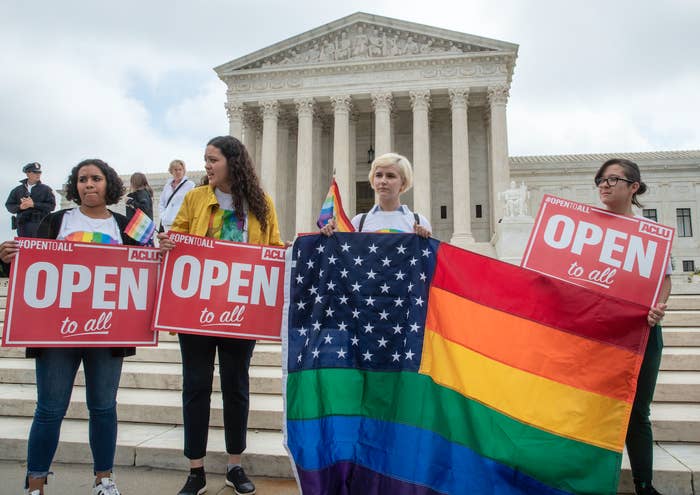
Activists and politicians on both sides of the Masterpiece Cakeshop case — in which a baker refused a custom wedding cake for a gay couple — wanted a clear ruling on the intensely charged question of what happens when LGBT rights and religious exercise clash.
Instead, the Supreme Court on Monday gave them a puzzle, with the underlying legal questions unanswered. Both sides were left straining to spin the result as a win.
The court ruled 7–2 in favor of Jack Phillips, the Colorado baker, handing him a narrowly tailored victory. But rather than decide if Phillips had a First Amendment right to refuse the service — as he'd argued, which could have had thundering implications for civil rights and religious liberty — the court found the Colorado Civil Rights Commission showed "hostility" toward his religious views when it adjudicated the case.
Justice Anthony Kennedy's majority opinion reversed the commission's decision, but, he said, similar disputes "must await further elaboration in the courts."
The ACLU, which had represented the gay couple in the case and lost, nonetheless trumpeted the decision on a sunny note.
"Supreme Court Upholds Basic Principles of Nondiscrimination," declared a press release, which noted the court recognized anti-gay and anti–religious discrimination are both protected under Colorado law.
"The court did not accept arguments that would have turned back the clock on equality by making our basic civil rights protections unenforceable, but reversed this case based on concerns specific to the facts here," the group said.
On the other side, Phillips’s lawyers played up the ruling in a conference call with reporters.
"It's a 7–2 ruling — that is a broad ruling," said Kristen Waggoner, a top lawyer for the group Alliance Defending Freedom, who argued on behalf of Phillips at the Supreme Court.
But the broadness of a court’s ruling is not measured by the number of justices who join the majority, but rather by the clarity and scope of the decision and how widely it can be applied. Monday's ruling was expressly limited and left the future foggy.
A press release from the group was particularly upbeat: "This decision makes clear that the government must respect Jack’s beliefs about marriage.”
Asked directly if the decision had implications for cases when public officials don't show anti-religious animus in tribunals like the one for Phillips, Waggoner acknowledged the limits of Monday's ruling.
"I think it leaves the question of how the courts will balance those issues," she said. "There are a number of cases being litigated in courts of appeal."
Attorney General Jeff Sessions said he was "pleased" with the decision. He had filed a brief supporting Phillips, saying the baker had a First Amendment right to recuse himself from the service, and his top Supreme Court lawyer, Solicitor General Noel Francisco, argued that position at court. But Sessions’ press release sidestepped the fact that the court didn't actually rule on that issue, instead saying Colorado officials "failed to show tolerance and respect for Mr. Phillips’ religious beliefs."
Despite the ruling’s narrow scope, Waggoner said the decision still opens doors for religious conservatives to advance their agenda. She said the court's decision could have particular implications for a case from Washington state, where a florist declined to make an arrangement for a gay couple's wedding in 2013.
In that case, Washington state Attorney General Bob Ferguson brought a lawsuit against Arlene's Flowers and its owner, Barronelle Stutzman. Waggoner contended that Ferguson was hostile because he sought damages from Stutzman in her personal capacity and bypassed that state's civil rights commission. That, she said, leaves open the possibility that the Supreme Court could take up Stutzman's case or send it back to the lower court in light of Monday’s decision.
She also cited other cases in Arizona and Colorado that could bring the underlying legal questions back to the Supreme Court — that is, whether First Amendment rights to free speech and religious exercise allow shopkeepers to refuse certain wedding-related services.
"We expect the court will eventually have to rule," Waggoner added.
